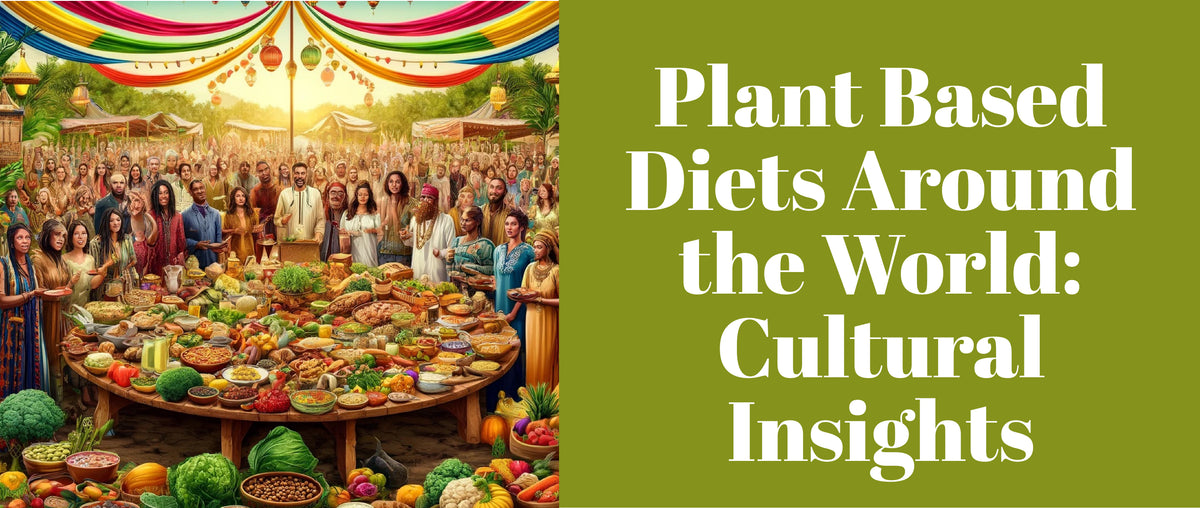Plant Based Diets Around the World: Cultural Insights
plant based diets are gaining popularity worldwide due to their numerous health benefits, ethical considerations, and environmental sustainability. Understanding the cultural contexts in which these diets thrive can provide valuable insights into their global appeal. This article delves into the historical, cultural, and modern aspects of plant based diets around the world, shedding light on the various factors that influence dietary choices.
Key Takeaways
- Plant Based diets are deeply rooted in history and culture across many regions.
- Religious beliefs and ethical considerations play significant roles in the adoption of Plant Based diets.
- Modern trends show a growing interest in Plant Based foods due to health and environmental concerns.
- Plant Based diets offer numerous health benefits, including improved heart health and weight management.
- The Plant Based food market is rapidly expanding, driven by consumer demand for healthier and more sustainable options.
Historical Context of Plant Based Diets
Early Plant Based Practices
Ancient civilizations often relied on Plant Based diets due to the availability of resources and agricultural practices. In regions like Asia, Africa, and the Mediterranean, plants formed the staple diet, complemented by locally available herbs and spices.
Religious Influences
Religious practices have significantly influenced dietary choices. For instance, Hinduism and Buddhism promote vegetarianism as a means of non-violence and compassion towards all living beings. Similarly, Jainism strictly adheres to a Plant Based diet, avoiding any harm to animals.

Why Some Cultures Eat Mostly Plant Based
Historical and Socioeconomic Factors
Historically, Plant Based diets have been more economical and sustainable for many cultures. In regions where agriculture was the primary source of food, Plant Based diets became the norm. Economic factors also play a role, as plant based foods are often more affordable and accessible than meat and dairy products.
Religious and Ethical Reasons
Religious teachings and ethical beliefs are powerful motivators for adopting Plant Based diets. Many cultures emphasize the importance of compassion and non-violence, leading to dietary practices that avoid animal products.
Cultural Practices and Regional Insights
Asia
In Asia, countries like India and China have rich traditions of Plant Based diets. In India, vegetarianism is widely practiced, with a variety of flavorful and nutritious dishes. In China, traditional diets emphasize vegetables, tofu, and grains, with minimal use of animal products.
Europe
European diets, particularly in the Mediterranean region, are known for their emphasis on fresh vegetables, fruits, legumes, and whole grains. Modern trends also show a growing interest in vegan and vegetarian diets, driven by health and environmental concerns.
Africa
Traditional African diets are predominantly Plant Based, featuring staple foods like grains, legumes, and vegetables. These diets are often rich in nutrients and have been associated with lower rates of chronic diseases.
Americas
In the Americas, Native American diets were historically Plant Based, incorporating a variety of fruits, vegetables, and grains. Contemporary shifts towards Plant Based diets are influenced by health trends and environmental awareness.
Vegan and Vegetarian Cuisines
Popular Dishes
Plant Based cuisines offer a wide array of delicious and nutritious dishes. Popular vegan and vegetarian dishes include Indian curries, Mediterranean salads, Japanese sushi, and Mexican tacos, all made with Plant Based ingredients.
Regional Specialties
Each region has its unique Plant Based specialties. For instance, Italy is known for its pasta dishes with vegetable sauces, while Mexico offers a variety of bean-based dishes. Exploring these regional specialties can inspire new and exciting Plant Based meals.
Foods for Plant Based Diets
Essential Ingredients
A balanced Plant Based diet includes a variety of essential ingredients such as legumes, nuts, seeds, whole grains, and vegetables. These foods provide essential nutrients and support overall health.
Nutritional Benefits
Plant Based foods are rich in vitamins, minerals, and antioxidants. They offer numerous health benefits, including improved digestion, lower risk of chronic diseases, and better weight management. Including high-protein snacks like nuts and seeds can help meet protein needs, while low calorie foods like fruits and vegetables support healthy weight loss.
Motivations Behind Plant Based Diets
Health Reasons
Health is a major motivator for adopting a Plant Based diet. Studies have shown that Plant Based diets can reduce the risk of heart disease, diabetes, and certain cancers. They are also beneficial for weight management and Muscle Recovery, making them popular among athletes and fitness enthusiasts.
Environmental Impact
Plant Based diets are more sustainable and environmentally friendly compared to diets high in animal products. They require fewer resources, produce less greenhouse gas emissions, and have a lower ecological footprint. As awareness of climate change grows, more people are turning to Plant Based diets as a way to reduce their environmental impact.
Ethical Considerations
Ethical concerns about animal welfare and the conditions of factory farming are driving many people to adopt Plant Based diets. Veganism, in particular, emphasizes the avoidance of all animal products as a stance against animal cruelty.
Also Read
Modern Trends and Market Insights
Global Market Trends
The global market for Plant Based foods is expanding rapidly. Consumers are increasingly seeking out products like vegan cheese, Plant Based meat alternatives, and dairy-free milk. This trend is driven by a growing awareness of health and environmental benefits.
Consumer Behavior
Consumers today are more informed and conscientious about their food choices. They prioritize healthy eating and are willing to pay a premium for products that align with their values. This shift in consumer behavior is influencing the food industry to offer more Plant Based options.
Challenges and Future Prospects
Nutritional Challenges
While Plant Based diets offer many benefits, they also come with challenges. Ensuring adequate intake of certain nutrients like vitamin B12, iron, and omega-3 fatty acids can be difficult without careful planning. Including fortified foods and supplements can help address these nutritional concerns.
Future Trends
The future of Plant Based diets looks promising, with continued growth and innovation in the food industry. New products, improved nutritional profiles, and greater availability will make it easier for people to adopt and maintain Plant Based diets.
Conclusion
Plant Based diets are deeply rooted in cultural, historical, and ethical contexts. They offer numerous health benefits and are more sustainable for the environment. As global interest in Plant Based diets continues to rise, understanding the cultural insights and motivations behind these diets can help promote healthier and more sustainable eating practices.
Craving a delicious vegan meal? Look no further! We've got a guide to the best vegan restaurants in India, ready to help you discover amazing Plant Based eats in your city.










